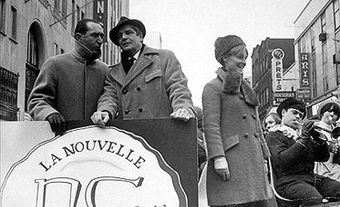Manitoba Theatre Centre
In 1958 the Winnipeg Little Theatre, a well-established amateur group, and Theatre 77, an ambitious semi-professional company founded by John Hirsch and Tom Hendry, amalgamated to form the Manitoba Theatre Centre. The resulting combination of institutional solidity and artistic zeal proved to be an ideal formula for an enduring community-based professional theatre. MTC was the first Canadian regional theatre and, at the time of its founding, one of a handful of such theatres on the continent.
From its inception MTC made efforts to represent its community by supporting diverse theatrical activities. Performances took place at the Dominion Theatre, an old vaudeville house near the corner of Portage and Main in Winnipeg. Hendry was the first administrator and Hirsch the artistic director. The company began operations as a semi-professional venture, becoming entirely professional in 1960, the same year it received its first Canada Council grant ($12 000). Throughout the next decade, the Council used MTC as a model for other Canadian regional theatres.
Hirsch's 8-play seasons included classics and serious modern plays mixed with some lighter works. Productions included many of Canada's leading actors; because most of them also acted in the Stratford Festival in Ontario, the theatre was known for a time as "Stratford West." Perhaps Hirsch's most famous production was Bertold Brecht's Mother Courage (1964-65), with Zoe Caldwell, Frances Hyland, Douglas Rain, William Needles, Len Cariou and Martha Henry.
Hendry left the theatre in 1963 and Hirsch in 1966. Edward Gilbert was artistic director from 1966 to 1969 and among his notable achievements was a 1967 production of Ann Henry's Lulu Street, the last new play by a Manitoba writer to be presented on the MTC Mainstage for 25 years. After the Dominion Theatre was demolished in 1968, the company played 2 seasons in the 2263-seat Centennial Concert Hall, before it moved into its newly built home in November 1970.
The 789-seat theatre located on Market Avenue proved a mixed blessing; though comfortable and well equipped, it was expensive to run and many believed the abundant use of raw concrete in the decor created poor acoustics and an unwelcoming atmosphere.
Kurt Reis took over as artistic director for the 1969-70 season, and Keith Turnbull for 1970-72. Both these young men found themselves at odds with the MTC board of directors, and their tenures were terminated prematurely. Edward Gilbert returned for 1972-75. Len Cariou returned from Broadway to be artistic director in 1975 but, after one successful season, notable for his own performances in Rostand's Cyrano de Bergerac and Peter Shaffer's Equus, he returned to Broadway. Arif Hasnain assumed the artistic directorship from 1976 to 1980 during which time his most successful show was Kurt Reis's atmospheric production of Tennessee Williams's The Night of the Iguana in the 1977-78 season.
Throughout the 1970s MTC was increasingly attacked for conservative programming, for its failure to produce Canadian work and for its isolation from the local community. There was little continuity of acting personnel from one season to the next and casting was often done through an American agency.
Richard Ouzounian, artistic director from 1980 to 1984, won back many subscribers and increased the profile of the theatre in the community. He attempted to institute a core resident company of actors, an experiment that was only partially successful. His signature production was a version of The Taming of the Shrew set in Winnipeg, with a "punk" Kate and several roles played as caricatures of local celebrities.
James Roy, artistic director from 1984 to 1986, presented more Canadian works than had his predecessors, notably a new musical, Tsymbalay by Ted Galay, which attracted large audiences from Winnipeg's Ukrainian community. Although Rick McNair (1986-89) continued the trend to produce more Canadian work, audiences declined during his tenure as artistic director.
In 1989, Stephen Schipper took over as artistic director with the goal of restoring the theatre's finances. His tenure has made MTC "the most successful regional theatre in Canada," as he boasted in 1997. Schipper's seasons were centered on the latest Broadway and British successes, and increasingly on musicals such as Cabaret (1998-99), Camelot (2001-02) and Evita (2002-03). He has gained attention and new audiences by casting Hollywood stars such as Keanu Reeves (Hamlet 1994-95), Judd Hirsch (Death of a Salesman 1996-97) and William Hurt (Richard III 2002-03). He has also done some more adventurous programming, including premieres of 3 plays by local playwright Maureen Hunter (Transit of Venus, 1992-93, Atlantis, 1995-96, and Vinci 2001-02).
A fundraising campaign launched in 1998 resulted in a $5.3-million makeover of the front-of-house areas of both MTC theatres, resulting in much more appealing facilities for audiences. Schipper's sense of local taste resulted in a large subscription audience that in good years has reached up to 3% of Winnipeg's population.
The long-term success of the theatre is above all due to the astute financial management of Schipper and his general manager, Zaz Bajon. Although some years have been more profitable than others, the company's care in matching expenses to income has meant that it has very rarely run a deficit. In the chronically risky business of theatre, security has been achieved through financial cushions, including an endowment of close to $10 million and a reserve fund of $1 million. As well, the theatre has been notably successful in fundraising, often using imaginative techniques.
Since 1960 the Manitoba Theatre Centre has operated a smaller "second stage," accommodated since 1969 in the 300-seat Warehouse Theatre. Originally intended to focus on the production of new plays, in its early years it presented mainly Canadian and avant-garde works. In recent years it has presented a variety of small-scale works, many of which contain material considered too controversial for the Mainstage.
Since 1988 MTC has administered the Winnipeg Fringe Festival, now the second-largest on the continent. It also coordinates an annual festival devoted to mainly amateur or semi-professional productions of the works of important modern playwrights, beginning with BeckettFest in 2001.

 Share on Facebook
Share on Facebook Share on X
Share on X Share by Email
Share by Email Share on Google Classroom
Share on Google Classroom


